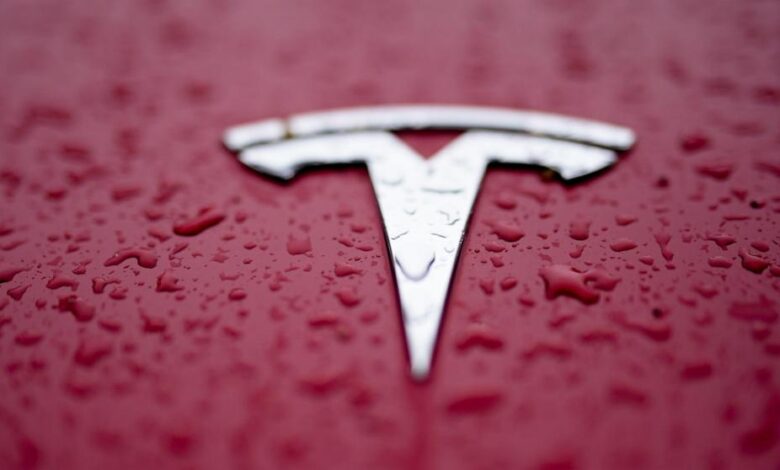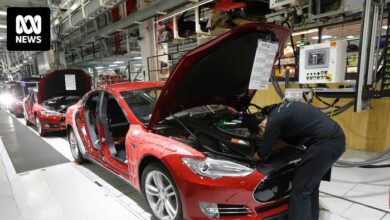Tesla wants shareholders to reinstate $56 billion Musk pay package tossed by a Delaware judge

DETROIT — Tesla will ask shareholders to reinstate a $56 billion compensation package for CEO Elon Musk that was rejected by a judge in Delaware this year, and to move the electric car maker’s corporate home from Delaware to Texas.
In a filing with federal regulators early Wednesday, the company said it would ask shareholders to vote on both issues during its annual meeting on June 13.
In January, Chancellor Kathaleen St. Jude McCormick ruled that Musk is not entitled to a landmark compensation package awarded by Tesla’s board of directors that is potentially worth about $55.8 billion over 10 years starting in 2018.
Five years ago, a Tesla shareholder lawsuit alleged that the pay package should be voided because it was dictated by Musk and was the product of sham negotiations with directors who were not independent of him.
Musk said a month after the judge’s ruling that he would try to move Tesla’s corporate listing to Texas, where he has already moved company headquarters.
Almost immediately after the judge’s ruling, Musk did exactly that with Neuralink, his privately held brain implant company, moving its corporate home from Delaware to Nevada.
In a letter to shareholders this week, Chairperson Robyn Denholm said that Musk has delivered on the growth it was looking for at the automaker, with Tesla meeting all of the stock value and operational targets in a 2018 CEO pay package that was approved by shareholders.
“Because the Delaware Court second-guessed your decision, Elon has not been paid for any of his work for Tesla for the past six years that has helped to generate significant growth and stockholder value,” Denholm wrote. “That strikes us — and the many stockholders from whom we already have heard — as fundamentally unfair, and inconsistent with the will of the stockholders who voted for it.”
Tesla posted record deliveries of more than 1.8 million electric vehicles worldwide in 2023, according to a regulatory filing. But the value its shares has eroded quickly this year as sales of electric vehicles soften.
Future growth is in doubt and it may be a challenge to get shareholders to back a fat pay package in an environment where competition has increased worldwide and demand for electric vehicle sales is fading.
Tesla’s shares have lost more than one third of their value this year as massive price cuts have failed to draw more buyers. The company said it delivered 386,810 vehicles from January through March, nearly 9% fewer than it sold in the same period last year.
Shareholders also will be asked to cast a nonbinding advisory vote on 2023 executive compensation.
But the proxy statement filed with the Securities and Exchange Commission does not address Musk’s demand to own 25% of Tesla shares for him to pursue artificial intelligence and robotics at the company. At present he owns 20.5% of the company.
In January Musk challenged the Tesla board in a post on X, the social media platform he now owns, to come up with a new compensation package. Unless he gets 25%, he wrote that he’d prefer to build products outside of Tesla, apparently with another company.
Wedbush analyst Dan Ives, who is normally bullish on Tesla, said in an interview that the filing doesn’t address multiple issues including Musk’s future compensation.
“It’s the elephant in the room because Musk has threatened over X, and it’s been a massive overhang” for Tesla stock, Ives said.
Musk, he said, needs to commit to being Tesla CEO for three to five years and developing artificial intelligence with the company. When the company announces first-quarter earnings next week, Musk needs to spell out plans for future growth, including the status of the Model 2, a small EV that costs about $25,000, Ives said. Otherwise, dark days lie ahead, he said.
“Investors are not just taking Musk’s word,” he said. “There’s a feeling like the plane is crashing into the ocean and the board is focused on their own salted peanuts.”
Musk has less leverage than he did in January because of this year’s stock slide. “He went from Cinderella story to the Nightmare on Elm Street in a matter of six months,” Ives said.
At the time of the Delaware court ruling, Musk’s package was worth more than $55.8 billion, but the court may have cost the mercurial CEO over $10 billion due to the company’s stock slide this year. The filing said Musk’s 2018 compensation was worth $44.9 billion at the close of trading on April 12.
Since last year, Tesla has cut prices as much as $20,000 on some models. The price cuts caused used electric vehicle values to drop and clipped Tesla’s profit margins.
This week, Tesla said it was letting about 10% of its workers go, about 14,000 people.
In the filing, Tesla’s board wrote that the decision to seek shareholder approval of Musk’s 2018 pay package was made by the board after it received a report from a special committee of one board member, Kathleen Wilson-Thompson.
The board wrote that if there is any significant vote against future executive pay packages, “we will consider our stockholders’ concerns, and the compensation committee will evaluate whether any actions are necessary to address those concerns.”
Shares of Tesla Inc., which slid another 8% this week, fell about 1% Wednesday.
____
Chapman reported from New York. This story has been corrected to explain that shareholder voting on future executive compensation is advisory only.



